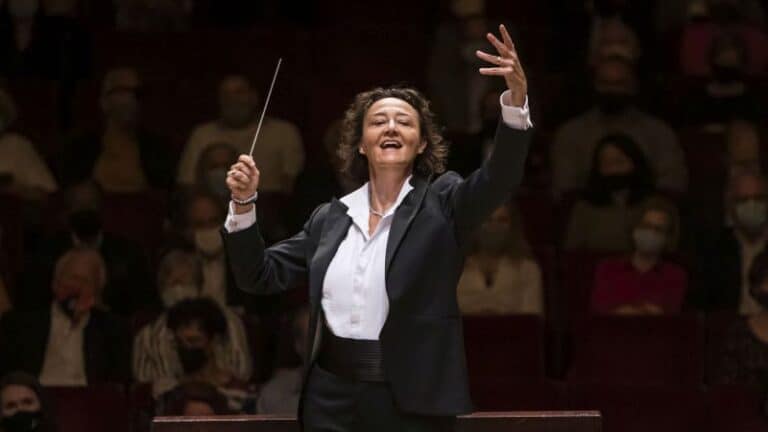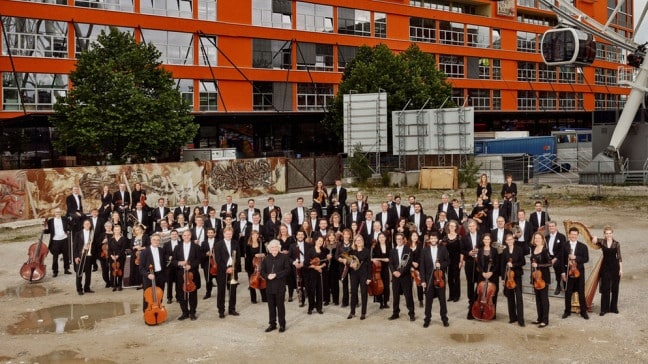Review: What Nathalie Stutzmann brings to the party
NewsFrom a review of this week’s Atlanta concerts by Mark Gresham:
…. What we got is a very different sensibility from what this orchestra (or American orchestras in general) is accustomed. But the ASO is an accomplished, flexible, and open-minded ensemble that is willing to experiment and learn new things. And what Sturzmann brings to the table seems musically insightful, fresh, and promising.
What will be most interesting is when Stutzmann returns in March 2022 to conduct Mozart’s Requiem. In a quote in the ASO’s press release of Wednesday morning, she described doing the Requiem as one of several “ambitious” projects. Really? Not technically ambitious for this chorus, which has performed Mozart’s Requiem quite skillfully over the decades. What may be ambitious is the discovery of how much Stutzmann’s sensibilities, as demonstrated in the Tchaikovsky Fifth, clash or jive with the legacy of Robert Shaw’s rhythmically driven choral techniques. That legacy remains today at the core of the ASO Chorus’ sound and artistic history. But the ASO Chorus itself has not been together for many months due to the pandemic. We will have to wait and see if this forthcoming Mozart Requiem marks a sharp turning point in that ensemble’s path forward.
Read on here.







Why are they still talking about Robert Shaw? The orchestra really got its footing and soared to fame under the fantastic Yoel Levi and then Robert Spano. Both brought rhythmic precision and a powerful, balanced sound that Shaw could never achieve.
The Robert Shaw reference is in a paragraph about the Atlanta Symphony Chorus, not the orchestra. And it’s undeniable that Shaw put the ASO organization on the map because of that superb chorus, which has maintained Shaw’s influence in the years since his departure. Nathalie Stutzmann is a terrific singer, and it’s natural for the critic—and the Atlanta audience—to wonder about what her influence on the ASO Chorus will be in the coming years.
The review link above doesn’t work, by the way. It should be
https://www.earrelevant.net/2021/10/stutzmann-brings-a-different-sensibility-to-atlanta-symphony-orchestra/
Yes, there were evidently just some extra characters in the link posted (easy for Norman to fix). I will be redundant and post again the correct link to the review: https://www.earrelevant.net/2021/10/stutzmann-brings-a-different-sensibility-to-atlanta-symphony-orchestra/
This is probably like they will always talk about George Szell in Cleveland. And I’m sure he’s a lovely man and better than I think, but I rarely have seen “fantastic” and “Yoel Levi” in the same sentence. Also part of a longtime Cleveland-Atlanta connection that often seemed like Atlanta was the little brother – Robert Shaw, Louis Lane, Levi all moving to Atlanta after Cleveland stints. Telarc. My brother’s old oboe teacher told of going to audition for the Atlanta Symphony and finding John Mack on the audition panel (and evidently not a blind audition).
Oh, my god, I can hardly wait for the reports. I mean, come on; how’s this news!?! . . . So the ASO Chorus will be a bit rusty. Wouldn’t that be expected? I think the more interesting question is what her long term programming ambitions will be.
Not a matter of the ASO Chorus being “rusty,” as that is not the case, but a matter of likely different “sensibilities” between Stutzmann and the Robert Shaw tradition, as evidenced by the concert in question. These are evidently even different between Stutzmann and Spano on the orchestral level, but probably closer to Runnicles. The choral legacy of Robert Shaw (and his choral techniques) casts a long shadow. Spano certainly felt it. With Stutzman a practicing professional singer, I am guessing some changes in choral technique, or at least final choral sound, will be forthcoming. The issue could be really deep, and as suggested, mark a turning point for the chorus. We’ll have to see. I will learn more once I sit down and speak with Stutzman, which I have not yet been able to do.
Fair enough, but I still feel her programming ambitions are the more interesting question.
I look forward to what Natalie Stutzmann will do in Atlanta, but the Mozart Requiem hardly seems like a bold statement. And I for one prefer the c minor Mass.
As for the ASO Chorus, times may have changed, but when I saw them on tv once (and it might well have been over 20 years ago now) I was surprised to see almost no Black singers. This isn’t some “woke” thing; Black churches have an amazing singing tradition and it’s hard to believe that in a predominantly Black city like Atlanta there wouldn’t be a huge population of excellent Black singers from whom the ASO could draw for its great chorus, and use it to inspire creative programming.